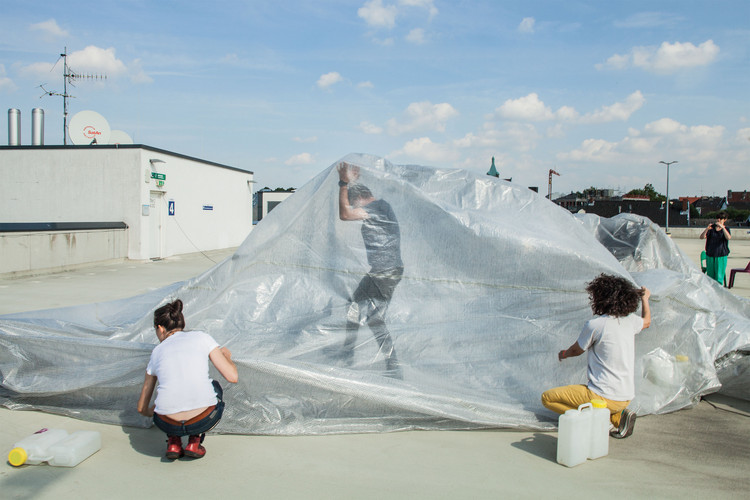Making Futures Bauhaus+
Making Futures Bauhaus+
Making Futures bauhaus + is an action research project that enquires into the future development of the architectural practice addressing questions of architecture as a collective form and architecture as a resource.
Within the Bauhaus anniversary in 2019, Making Futures Bauhaus will host a summer school on designing possible futures and questioning their connection to the past future-imagination of the Bauhaus. As a first step in this year and a half long process we start with a plug-in format as part of the Floating University Berlin.
Plug-In at Floating University 29.06-05.07.2018
Inspired by the Artist Placement Group’s strategies of artistic insertions into existing (institutional) frameworks, Making Futures plugs into the Floating University by contributing to its public programming with a series of workshops that operate as collective acts, dedicated to enquire, learn and test future modes of architectural and urban action.
Throughout a week of workshops we delve into the future development of spatial practices by exploring topics such as spaces of coexistence; the right to play, affective tactics, practices of assembly and co-production of knowledge about the city, for our city.
With: Arquitectura Expandida (Bogotá),Tor Lindstrand (Stockholm),Takk (Barcelona),Sofia Dona (Athens),Studio Basar (Bucharest)
Workshops everyday 11:00- 17:00 – DOWNLOAD Program -> auf Deutsch and -> in english
All activities are free of charge, places are limited. Please register at: makingfutures@raumlabor.org
Floating University Berlin – Lilienthalstraße, 10965 Berlin-Kreuzberg
Program Plug-in: Five workshops on future modes of architectural and urban action
29.06, 30.06 & 01.07
Arquitectura Expandida: Collective and Affective Tactics
Can we design methodologies to collectively organise and activate common spaces? Departing from an unfinished repertoire and always under construction, this workshop proposes to explore tactics that focuses on relationships – affective, conflictive, historical, symbolic, collaborative or normative- between different actors within a territory. For instance, the quest for a specific common purpose, to instigate verbal and non-verbal dialogues through spatial actions, to voluntarily dismantle dynamics fixated on achieving consensus or to deliberately incorporate love as a structuring condition of a project.
Arquitectura Expandida (AXP) is a design collective based in Bogota, Colombia – a citizen-led laboratory that builds structures -physical, social and cultural- that invite communities to self-organise and take responsibility towards their own territory. AXP allies itself with local community leaders and organisations, but avoids a central role, providing only the design and construction expertise for the execution of the projects. The collective’s design philosophy also relies heavily on an embrace of sustainable, affordable and reclaimed materials.
30.06-01.07
Takk: Spaces of Coexistence
How can architecture mediate spaces of relationship and negotiation not only between us -humans- but also with machines and other living beings? Can we define new notions of beauty through the articulation of the difference and by assembling a multiplicity of materials from different origins and conditions, paying attention both to their physical properties and to their symbolic associations? In this workshop participants are invited to design and build a small intervention by unraveling all forms of life around the Floating University and exploring the notion of coexistence – of species, materials, relationships.
Takk (mireia luzárraga + alejandro muiño) is a space for architectural production focused in the development of experimental and speculative material practices in the intersection between nature and culture in the contemporary framework, with a special attention on the overcoming of anthropocentrism on its different ways (political, ecological, cultural, on gender…). Additionally to their professional practice, they teach at Universidad de Alicante (UA), the Instituto Europeo di Design in Madrid (IED Madrid), and the Institute of Advanced Architecture of Catalonia in Barcelona(IAAC).
03.07-04.07
Sofia Dona: Renovictions
This workshop is worried about ‘Entmietung’ a strategy of landlords in Germany and elsewhere that is used to evict their tenants using renovation as an excuse and instead destroying partly the building. Broken water pipes, blocked toilettes, removed roofs, permanent facade scaffolds and renting flats to noise bands, are some of the ways property owners follow. How to resist the tricks? Looking at housing and property issues violently transforming the cities in the last years, this workshop aims to invent tactics of resistance against renovictions.
Sofia Dona is an architect and artist based between Munich and Athens, realizing projects in the field between architecture and art in various cities around the world, including Athens, Leipzig, Detroit, Los Angeles, Pisa or the border area of Tijuana and San Diego. The last two years she has been teaching at the Technical University of Munich, Chair of Urban Design and Regional Planning. She is recently awarded the City of Munich 2018 Prize for Architecture (Förderpreise 2018).
04.07-05.07
studioBASAR: City as a Library
Knowledge today is increasingly produced and distributed through a capitalist logic. The workshop will investigate open source mechanisms to emancipate city inhabitants from data mining resources into becoming co-producers of knowledge about their city, for their city. Through investigative walks, situated narratives and action design, we will explore the Floating University’s surrounding neighbourhood, looking into ways for collecting, co-producing, representing and sharing different kinds of situated, tacit or contextual knowledge. From this standpoint, we will ask: what library-like format could accommodate such content?
studioBASAR is a Bucharest based architectural studio and a public space practice founded in 2006 by Alex Axinte and Cristi Borcan. Preoccupied with the dynamics of urban culture and the disappearing importance of public spaces, studioBASAR initiates and develops actions and projects within public space. Ranging from temporary to permanent, these processes include practice based research, participatory action research, community activation, co-production and co-design, urban design, live education and civic pedagogy.




